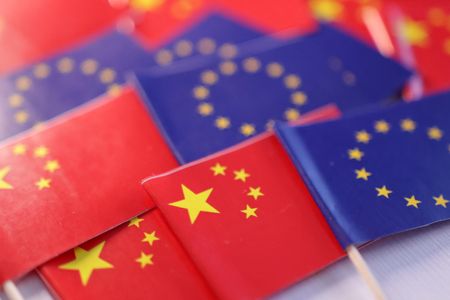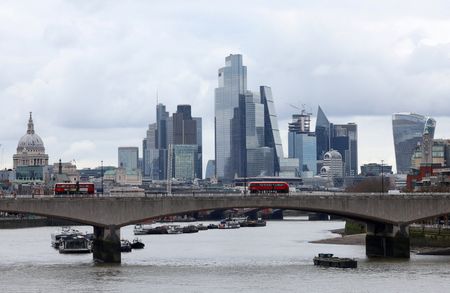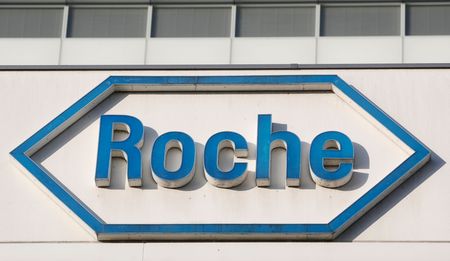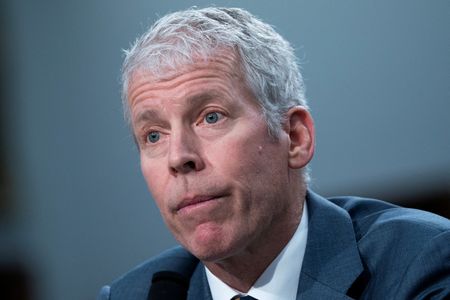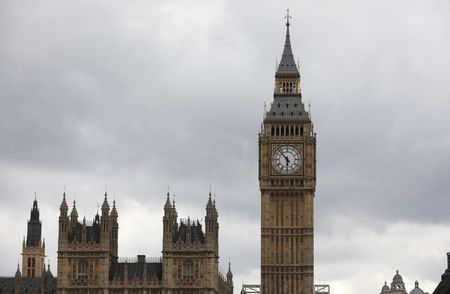By Laurie Chen
BEIJING (Reuters) -Expectations are rock-bottom for an EU-China summit on Thursday that will test European resolve and unity as the bloc faces intense trade pressure from both Beijing and the United States, analysts say.
European Commission President Ursula von der Leyen and European Council President Antonio Costa plan to press Chinese leaders on rare earths and the war in Ukraine, both areas of tension, during the summit in Beijing.
There is little hope for headway, at a time both sides face major challenges sustaining economic growth and Europe struggles to shore up support for Ukraine.
The summit was shortened from two days to one due to a “scheduling conflict” raised by Chinese officials, two sources familiar with the planning told Reuters. A business roundtable that was meant to happen on the second day in the city of Hefei will now take place in Beijing, one of the sources said.
Both sides may reach a modest joint statement on climate, one of the sources said, but no other tangible achievements are expected.
In multiple recent speeches, von der Leyen has revived hawkish China rhetoric, accusing China on July 8 of “enabling Russia’s war economy” and flooding global markets with overcapacity.
“We know that we don’t see eye to eye with China on many issues, but we believe that it is essential to have this kind of very direct and open and constructive conversation,” said one EU official.
The official and the sources declined to be identified as they were not authorised to speak to media.
A spokesperson for the European Commission referred to a statement announcing the summit, which said leaders would discuss ways of ensuring “a more balanced, reciprocal and mutually beneficial trade relationship”.
In response to Reuters’ questions, the Chinese foreign ministry referred to a spokesperson’s statement on Monday.
“Some people in Europe continue to … exaggerate specific economic and trade issues and make groundless accusations against China on the Ukraine issue, causing unnecessary interference to China-EU relations,” its spokesperson said.
RISING TENSIONS
The 27-member European Union has also been negotiating hard with Washington after U.S. President Donald Trump threatened 30% tariffs on most EU exports from Aug. 1, with prospects for a broader trade deal fading.
At the Beijing summit, China hopes to press the EU for a solution to its tariffs on China-built electric vehicles, for which Beijing claims price commitment negotiations are in the “final stages”. But European officials say there has been little progress for months.
Last week, China threatened to respond to EU sanctions on two Chinese banks and five firms over the Ukraine war. Its commerce ministry said on Monday the sanctions “seriously harmed trade, economic and financial ties”.
Other trade disputes are simmering in the background. China retaliated against EU restrictions on medical device procurement with its own curbs on July 6, and slapped duties on French cognac producers.
China’s exports to the EU grew in May while its U.S. exports plunged 34.5% in value terms the same month, sparking fears Chinese trade overcapacity is being diverted to the bloc due to U.S. tariffs on Chinese goods.
There is also a growing sense that EU firms are collateral damage for China’s rare earth export controls that primarily targeted Washington but have disrupted European defence and automotive supply chains.
In return for concessions on rare earths, China’s asks could include reviving a long-stalled investment agreement after Beijing lifted sanctions on European Parliament members in May, and pushing back on U.S. export curbs on Dutch firm ASML’s chipmaking equipment.
China has raised both in the weeks leading up to the summit, two sources familiar with the matter said.
‘GLOVES OFF’
“The mood is extremely pessimistic in Europe regarding the summit,” said Mathieu Duchatel, a director at the Institut Montaigne think tank in Paris, adding that Washington rejected previous EU proposals for coordination on China policy.
“There is a sense that the gloves are completely off on the Chinese side … They sense the transatlantic relationship has weakened and are trying to seize the opportunity.”
Diplomats and analysts also say that China is growing increasingly frustrated behind closed doors with European officials’ repeated insistence on the war in Ukraine, which Beijing views as an obstacle in the relationship.
There is little space for constructive dialogue on this, another EU official admitted, with Chinese counterparts denying evidence of Chinese firms’ involvement in supplying dual-use goods to Russia.
Meanwhile, China believes Europe will cave in to U.S. tariff pressure, said a diplomat familiar with Chinese official thinking.
Beijing succeeded in getting Trump to lower crushing 145% tariffs during talks in May and scored a further win when Washington agreed to resume Nvidia H20 AI chip exports, leaving it in a relatively strong position.
“This will be the latest in a long list of EU-China summits that have delivered next to nothing,” said Noah Barkin, senior advisor at Rhodium Group’s China practice.
“It is a sign that the economic and security problems in the relationship have become so deep-seated as to be irreconcilable.”
(Reporting by Laurie Chen in Beijing; Additional reporting by Andrew Gray in Brussels and John Irish in Paris; Editing by Aidan Lewis)

